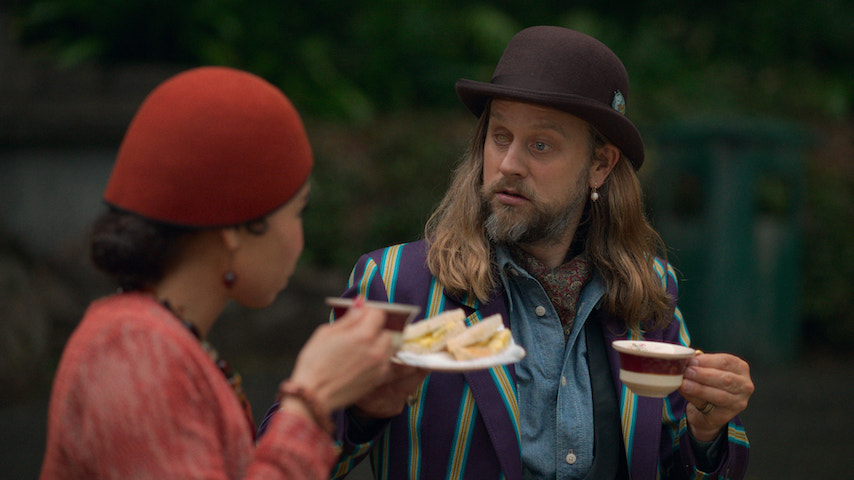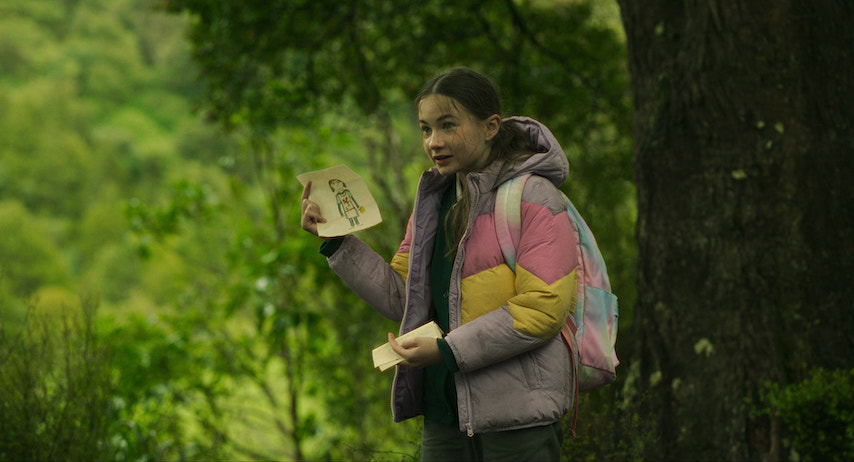Time Bandits goes all Goodfellas on us
The show nods to Scorsese's classic as the gang finds themselves in Prohibition-era NYC
Tadhg Murphy in Time Bandits (Photo: Apple TV+)
Fans of voiceover, you’re in luck: This episode has lots of it. Addressing his coal-parents, Kevin describes the innerworkings of the Time Bandits gang to them. “We’re not the toughest gang or the coolest or the most dangerous or the most coordinated,” he explains, “certainly not the best at stealth, or hiding…but we’re still a gang.” This voiceover accompanies sequences of the group clumsily taking and nearly dropping things from an eighth century English monastery. The way the show’s creators use this device throughout episode four feels like a clear homage to Goodfellas, and I respect it. It may not be the right era—this episode largely takes place in 1929, during Prohibition, while Goodfellas spans from the 1950s to the ’80s—but it’s a gangster movie, and this is TB’s gangster episode, so the reference checks out.
In a way, Saffron is living a bit of an outlaw lifestyle in this episode, too. She is unwittingly on the run from someone (Fianna) and, for the time being, is roaming the woods of 1200 C.E. Japan. There, she meets bow-wielding samurai badass Tomoe Gozen (Tomoka Tsuyuki), who sticks by her side and helps her out. This legendary new friend really springs into action when Fianna ultimately catches up to, and physically grabs, the kid. She does her best to defend Saffron, firing arrows until Fianna gets a good whiff of her target and realizes she has been chasing the wrong person. It’s Kevin she wants. Saffron is still searching for her parents, but in terms of the Pure Evil stuff, she seems to be off the hook for the time being.
Meanwhile, the main crew is busy traveling from that eighth-century monastery in England to a Prohibition-era warehouse in NYC, where they find they’re not alone. Some men in trench coats stand nearby. Penelope tells Kevin, “This might be dangerous,” in what seems a protective warning before adding, “Go see if it is. Thank you.” As Kevin returns to the bandits and whispers that he hears some men talking “gangster talk.” The men overhear him, too, and wonder aloud, “Is it gangster talk?” Once face to face, the men mistake Penelope’s gang for one led by Madame Queenie, the one they were supposed to be meeting, and offer them a bag of money in exchange for the contraband they’re expecting. Fortunately, Bittelig has jacked some mead from the monastery, which will do just fine for these fellows. The bandits have an easy access point in the portal to rush back and forth to secure more mead for their new friends, and this allows them to maintain this bootlegger ruse for a while—and make some cash while they’re at it. Besides, it’s not like the monks need the booze anyway.
Though at first the bandits think the American money is not real, just “tiny old-man paintings,” they soon see the power it has and get a little taste of the good life: new clothes, good drinks (soda for Kevin), and lots of fun in speakeasies. Alto, the actor of the group, has a brief dalliance with a jazz songstress who teaches him how to “speak jazz.” It’s basically just throwing some scat syllables into regular speech, as he understands it. Penelope gets to be close buddies with Bugsy Johnson, the leader of the crew they’ve begun selling mead to, and together they share their leader-related struggles and imagine new ways their respective gangs can become more leaderless in structure. A standout scene from the episode happens when the two go back and forth, imitating the facial expressions of people they’ve had to whack and/or intimidate until Penelope impersonates someone saying, “How could you do that to my butt!” Bugsy’s a little put off by that one. For a little while, it’s all finer things and bonding for this crew, until another gang steps in: Madame Queenie’s. And they’re mad at the bandits for encroaching on their territory.
These guys aren’t too scary, though, probably because they’re so frequently misunderstood. Madame Queenie’s henchmen speak in ominous “gangster talk” (phrases such “sleep with the fishes,” “pay them a little visit,” and the like), but their boss doesn’t get nonliteral language, and, with the exception of Kevin, neither do the bandits. Judy thought the henchmen’s request that they go for a drive together was friendly! Bittelig thought the cement shoes they put on their feet, as they were tied to chairs, were a nice gift.
You know, I could see autistic folks relating to these loveable bandits, the way that many responded to the character Drax in Guardians Of The Galaxy, loving him for his literal interpretations of language, his struggles with figures of speech, and his direct (frequently blunt) communication style. All along, as this series has progressed, I’ve seen nods to autistic culture crop up, especially in terms of communication patterns, special interests, and social differences. Whether this is intentional or not, I’m sure it really matters to some viewers. From a writing standpoint, this could just be some Amelia Bedelia-style silliness (a famously autistic-coded character, by the way), but judging from Lisa Kudrow’s previous acknowledgment of herself as falling somewhere on the spectrum on an episode of Conan O’Brien’s podcast, there seems to be some awareness around it here. It could be a win for inclusion, in a way.

Kiera Thompson in Time Bandits (Photo: Apple TV+)
There’s another effort toward inclusion, too: The two agents, sent by the Supreme Being, who show up to scan the crime scene at the Haddocks’ house, are played by little people. It demands attention, due to the casting controversy surrounding this show. And you know what? The actors are solid. The leader of the two concludes that the map, and Kevin himself, are powerful. Let’s hope they do something interesting with that—and with these two characters..
Before it all wraps up, there’s a very slow, round-the-block car chase, and Bittelig and Judy get trapped behind the portal for a hot minute. (I thought for a second that this might be the point at which Charlyne Yi was written out of the show.) But it resolves super easily. Penelope and Madame Queenie spend a bit wondering how the hell Bugsy got them mixed up, the bandits agree immediately to stop selling mead, the others are chill about it, and Queenie and Bugsy’s gangs are back in business. Done and done. And in a step toward the more egalitarian future he and Penelope have envisioned, Bugsy is even taking his guys on a little trip to Mexico (a literal two-week vacation, not murder). Penelope doesn’t really live by this ideal herself, but it’s nice that she ended up inspiring someone else to commit to it.
The episode ends with Supreme Being finally revealing that “super-duper top secret” scheme of his from episode two. He shows his associates his plan for what he is calling “Earth 2,” a.k.a. “the Great Reset.” He shares that he hasn’t been that happy with the original Earth, humans in particular. They have caused too many wars, too much strife and crap. He wants to start over, and he cannot do that without the map; that’s why he’s chasing down the bandits. Equally important, they can’t allow Pure Evil to intercept it along the way. SB says he shudders to think what would happen in that event, then, in the spirit of this very literal episode, the three of them stand around and shudder for real. Also, Damon is there in the corner, watching SB and his mates discuss this plan. Remember that? He was there, too.
This show has a way of accordion-folding in on itself that works well. It reminds me of Memento, the way they keep cycling back to something we’ve seen before, in one way or another, at least once an episode. It keeps us organized as the series continues to explore new tangents, and if you’re watching as a family as the creators anticipate, staying focused is key. The child protagonists in Tie Bandits may be lost, but we the audience don’t have to be. With some newly introduced characters and some fresh information about old ones, I’m pumped to see where they take us next.
Stray observations
- • I have to say, I really enjoy Taika Waititi’s take on God as being sort of like a great, big kid. He wears a robe, insists that dinosaurs were a perfect creation, and asks his buds to tell him their favorites. (His? A triceratops, because, “they have three…ceratopses.”) In the film, when not appearing as a giant, disembodied head, SB is more of a posh businessman type in a sensible, three-piece suit complete with pocket chain. I will concede that the big head in the movie looks a lot cooler than the one in the show, though. (Gotta love that Terry Gilliam animation style.)
- • You know who’s a legend? Akilah Green, who wrote this one. She left a career as a lawyer/lobbyist to become a writer, and has since been Emmy-nominated for her work on A Black Lady Sketch Show. She has also served as a writer-producer on Black Monday, Rap Sh!t, and Ghosts.
- • Poor Widgit isn’t doing well this episode. They’re drinking and partying in a speakeasy, but he’s “got a migraine; there are too many people around, too many people to distrust.” He misses Susan, too. And he doesn’t even get to talk about it, because Penelope shuts it down.
- • When Madame Queenie (Andrea Solonge) is introduced, she’s on the phone barking orders at an accomplice, first telling him to run a piece educating people about voting rights, next ordering him to smash a property’s windows in, then insisting he donate to a childhood reading program. (“Kids need to read!”) I like that her gang-leader character is also a bit of a philanthropist.
- • At one point, the bandits get into counterfeiting. The money looks ridiculous, hand-drawn like a child made it, and the bills have inspirational quotes on them, too. It’s just some good old-fashioned silliness.
- • When Fionna drops Saffron, saying, “It’s not him,” the girl shouts back, “You don’t know me pronouns!” and it feels like the whole joke there is, “Aren’t different pronouns funny?” It doesn’t really land.
- • You know, for an episode taking place during the Harlem Renaissance, other than Alto’s jazzy friend, there’s not much emphasis on this aspect. Maybe it’s enough to just acknowledge that it was happening and to show some guys painting and strumming guitars on the street.